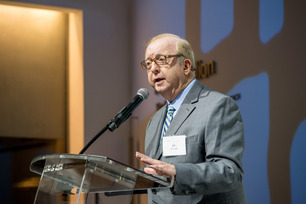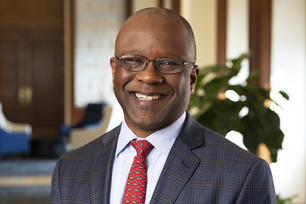About the Robert M. Ball Award
Each year, the Robert M. Ball Award is presented to an individual whose recent work has made a significant impact on the U.S. social insurance system.
The award honors Robert M. Ball, who served as Commissioner of Social Security from 1962 to 1973, and was an important participant in every Social Security development of the past 60 years. As the Founding Chair of the National Academy of Social Insurance (the Academy), he continued to serve as an unofficial advisor to many policymakers while also writing and advising on Social Security, Medicare, national health insurance, and welfare.
The Award was created in June 2003 at the celebration of Bob Ball’s 90th birthday.
Selection Criteria:
- Innovation in changing, educating about or otherwise furthering public understanding and informed policy-making in a specific area of social insurance
- Effectiveness in deepening public understanding, fostering collaboration, informing policy, implementing policy, or teaching others about social insurance
Academy Members may submit a nomination for the Robert M. Ball Award for Outstanding Achievements in Social Insurance by emailing nasi@nasi.org.
2024 Honorees
William J. Arnone

Willam J. Arnone receives the Ball Award after a long history of leadership of the Academy — most recently as Chief Executive Officer, from 2017-2024. He was a Founding Board Member of the Academy and served on the Academy’s Board of Directors from 1986 to 1994. He also served as the Chair of the Academy’s Board of Directors from 2013 to 2016.
Marty Ford

Marty Ford is Senior Advisor for Public Policy at The Arc of the United States, a national community-based organization advocating for and serving people with intellectual and developmental disabilities and their families. She served The Arc’s Senior Executive Officer for Public Policy from 2011–2019, leading the public policy team representing The Arc on Capitol Hill and before federal agencies.
William M. Rodgers III

William M. Rodgers III is vice president and director of the Institute for Economic Equity at the Federal Reserve Bank of St. Louis. Before joining the Fed, Rodgers served as professor of public policy at the Bloustein School for Planning and Public Policy and chief economist at the Heldrich Center for Workforce Development at Rutgers University.











 Jacob Hacker
Jacob Hacker
 Carroll Estes
Carroll Estes